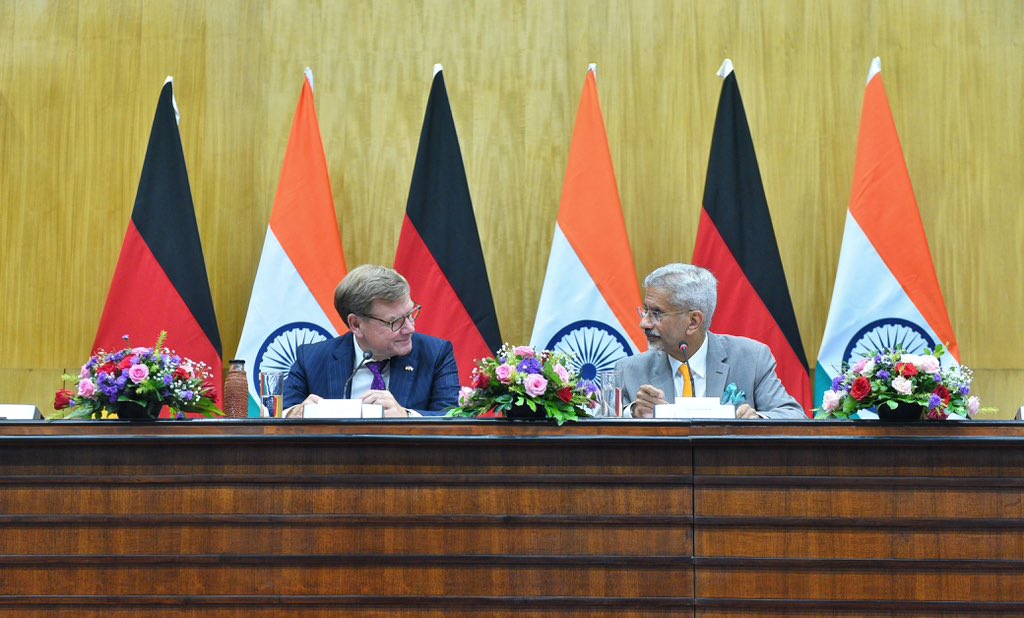
S. Jaishankar pushes for EU-India FTA with visiting German FM
NEW DELHI : India and Germany committed on Wednesday, September 3, 2025 to doubling trade and expediting efforts to complete the India-European Union Free Trade Agreement (FTA) under negotiation, amidst uncertainty over whether Europe would follow the United States in imposing secondary sanctions on countries for buying Russian oil.
After talks between German Foreign Minister Johann Wadephul and External Affairs Minister Dr. S. Jaishankar said the two sides had discussed the “twin challenges” of economic volatility and political uncertainty, a reference to the U.S.’ imposition of 50% tariffs and sanctions. Speaking at a press conference after the meeting, Mr. Wadephul called Russia and China the two biggest challenges to the international world order.
“We would like the [India-EU FTA talks] to move to a decisive conclusion in the coming days,” Mr. Jaishankar said referring to the next round of talks between trade negotiators, adding that an FTA would help stabilize the global economy, as a “ballast which today the world economy really needs”.
Indian and EU negotiators have fast-tracked their talks, and expect to meet more regularly, possibly every month in order to reach the year-end deadline set by EU President Ursula Von der Leyen and Prime Minister Shri Narendra Modi when they met in February this year. However, like the India-U.S. trade negotiations, the two sides have differences over issues like agricultural market access for food and dairy products, even as they have managed to complete about 10 of 23 chapters in the agreement.
Another major issue may arise between the two sides if the EU leadership follows U.S. President Donald Trump in imposing secondary sanctions on Indian companies due to the purchase of Russian oil. On Friday, German Chancellor Friedrich Merz announced that Germany and France would push for both the U.S. and the EU to enforce sanctions on “other nations whose purchases of oil and gas finance a large part of Russia’s war economy.” EU Foreign Ministers including Mr. Wadephul met on Saturday to discuss the 19th package of sanctions against Russia for its invasion of Ukraine in 2022, with a slew of measures including secondary sanctions on the agenda.
In Delhi, Mr. Wadephul did not respond directly to a question about whether Germany would endorse the penalty tariffs against India, but said their intention was to ensure Russia would come to the negotiating table with Ukraine.
“We have not used tariffs but sanctions that we have imposed on Russia so as to ensure that Russia which has to fund its war will be less able to do so”, he said adding that while EU countries didn’t want to stop countries from accessing the oil they need, Russia should not be able to use “detours” to sell its oil to Europe. In the last round of sanctions, the EU had banned trade with Nayara Energy, a consortium of Russian oil major Rosneft and other companies in India, and the supply of shipments to the company have since been curtailed.
The German Foreign Minister, who arrived in India a day after Prime Minister Narendra Modi’s meeting with Mr. Putin and Chinese President Xi Jinping made international headlines, also lashed out at Russian and Chinese “aggression”, and said he welcomed Mr. Modi’s call for a ceasefire in Ukraine during his meetings.
“China’s increasingly aggressive behaviour in the Indo-Pacific is cause for concern for both our countries,” Mr. Wadephul said, adding, “Security in the Indo Pacific is closely linked to security in Europe. Russia’s war of aggression, for us in Germany and Europe, remains the biggest challenge to our security policy.”
Mr. Jaishankar side-stepped the comments by the German Minister, saying that India believes that a “multi-polar world with strategic autonomy can best respond [to economic and political challenges] through more intensive consultations and cooperation among key member states”.
Mr. Wadephul’s two-day visit, just four months after he was sworn in with the new Government in Germany, came ahead of a proposed visit by German Chancellor Merz for a biannual summit later this year. The two sides discussed furthering cooperation in “security and defence, economic relations, research and future technologies, climate and energy as well as education, skilling, mobility and people-to-people exchanges” Mr. Jaishankar said, adding that both sides hoped to double bilateral trade from about €50 billion last year.

